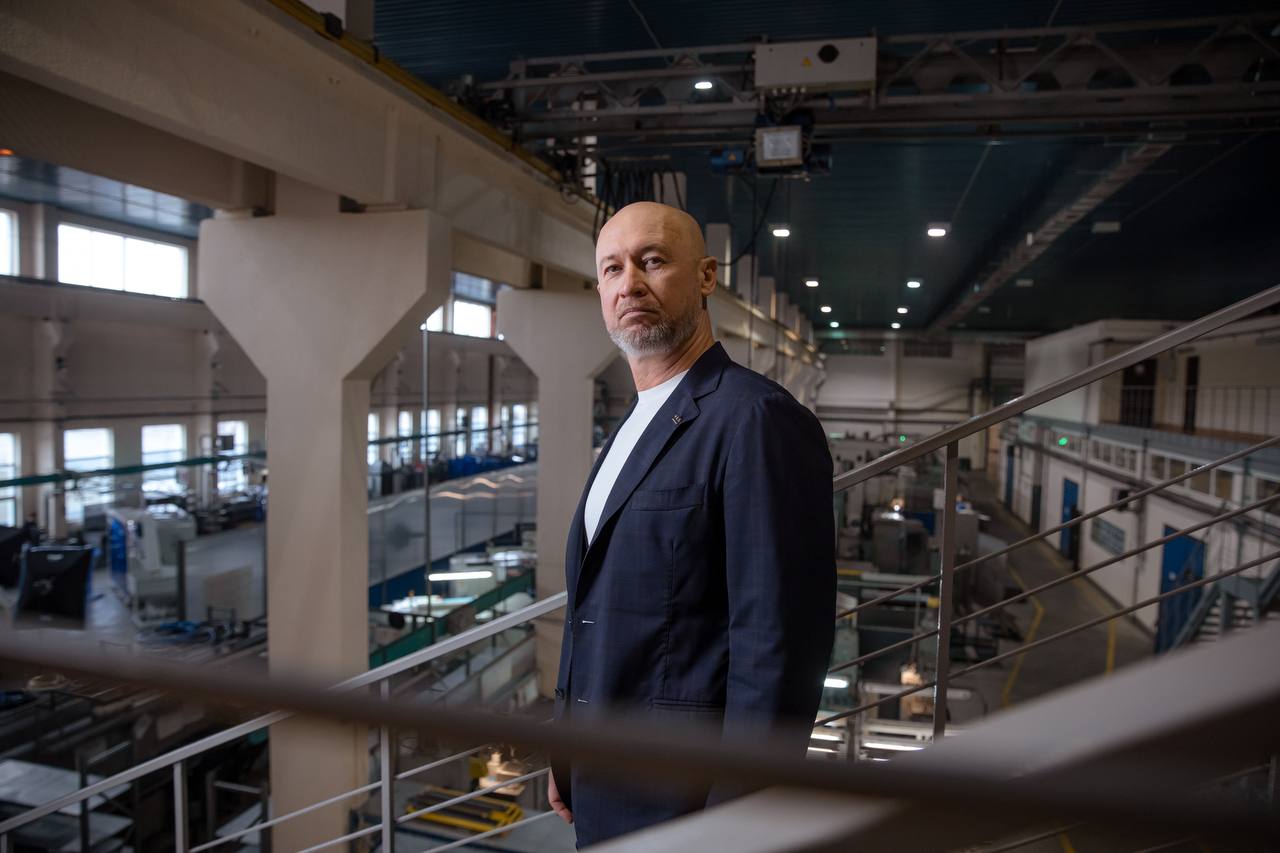SHORTAGE OF COMPONENTS, CONSTANT BLACKOUTS, FAILING LOGISTICS. HOW CAN THE UKRAINIAN MANUFACTURING BUSINESS SURVIVE?

If you are lucky and your enterprise has not been completely destroyed, moreover you have managed to restore its operation, my advice is first to complete unfinished deals to get at least a minimal turnover. This plan will work out better than developing unreal and complicated business chains.
I know it first hand. At present, I have two active businesses - Pet Technologies, a manufacturer of blow molding equipment and blow molds, two restaurants, plus a few start-ups.
Like most businesses, on February 24, we closed down. At 10 am, the sky over the town turned into a fireworks display of missiles and bombs.
The first thing my employees did on that day, they copied all construction databases and 1C. It was perfect timing, since the next day we had an electricity outage. Despite the popular idea of business relocation, I had not even thought about that.
On the 16th of April, plant operations were restored, and in May, the restaurant was reopened. How did we manage to relaunch companies and at least keep them afloat? Here are Step-by-step instructions
People
People are definitely the primary resource of the company and its weak spot.
Most employees of Pet Technologies left the town together with their families on the first days of the invasion. I didn’t make any announcements.
Nothing like “Stay and defend the town.” Nope. People’s safety has always come first. People and their families.
But as soon as it was possible, people came back to work—no big words or calls. Workers just came and started doing their job. This shows a unique trait of our resilient people: no matter how hard it is, they can pull themselves together to do what they are supposed to do. It should be mentioned during the first week of plant relaunching, there were constant energy blackouts or no electricity at all.
Getting people back to work was easy, but adapting them to a new reality after all they had been through, looked pretty challenging. The employees were not themselves, sometimes acting illogically. Here are a few examples. The employee didn’t show up to work or come at 9 am instead of 8 am. When asked to explain the reason, he just said: "But it’s war”. The employee left work at 3 pm instead of 5 pm. When asked why, the same reason - “it’s war.I can just stay at home and not come to work at all. “ We tried to communicate with these workers with particular care. I know people who have not left the town and experienced all the hardships and horrors of war will take a long time to recover. Some lost their homes. Some were left without water or electricity. Some were preoccupied with surviving the upcoming winter as long as no heating was promised.
But every cloud has a silver lining.
These crises, like previous ones, helped to spot people whose value to the company had been questionable. We had a few people like that. They all not only left the town but resigned from the company. The CEO claims that nothing has changed with their leaving. One way or another, but it’s true to say each crisis benefits the employer. Companies are closed down, and budgets are cut. No deficit in the labor market, hence employees are becoming more loyal. At times like this, it’s crucial not to abuse, neither cutting down the salaries nor becoming imprudent with people.
Just the other way round: encouraging them, saying - “You will undoubtedly survive this crisis with us. We are the plant, we are safe, we have the future, we have 25 years of experience behind us, and we are presented in numerous foreign markets. We will get over that.”
Production, raw materials, suppliers.
When the war began, we had five unshipped trucks of products. They were almost ready to be shipped but not completed by controllers with some precise mechanisms, which had been ordered in November. They should have been delivered to the plant in March, but the war started.
The Austrian company, the producer of these details, was merged with a large Chinese corporation, which controls one-third of the global market. Our order was almost nothing for them. We were just told - you have war in the country; it’s force Majeure, so all supplies are canceled. After long and complex negotiations, which lasted a few months, they promised to supply the parts by autumn. But we couldn’t wait. Our business is summer-oriented; our clients are not ready to miss the season. Not to lose those existing clients, we started looking for those parts on the open markets. Our Austrian specialist, Roland, found these missing parts on an open platform, bought them, and brought in his backpack to where the machinery was shipped. He simply did everything manually. And it worked! A small victory for not a small business.
Before the war, everything was well-oiled. Most of the prominent manufacturers had their own representatives in Ukraine. They worked
without a hitch. Goods were always in stock; we bought in Ukrainian currency with VAT and could quickly get all documents and certificates at our request. Moreover, they always had some volume in reserve just in case for us since we proved to be a reliable client. Now the part is these companies are out of the market, or they shortened their warehouses or closed down warehouses. What’s more, they all demand advance payment only. What previously was in abundance is now in shortage. You have to preorder, pay in full, and wait for your order to be delivered. Yet again, you have to wait two weeks at best instead of two days, as it was before the war. Bear in mind, since the currency rate is not stable, the suppliers fix the rate to the shipping date. And no one cares that you paid two weeks ago. You will be charged to pay the difference at the end if the rate has increased. But on the contrary, if the rate has decreased, no one will cover the difference. Consider it bad luck.
Before the war, I got an upfront payment for my machines at 31 UAH/1EUR. Now we buy accessories at 45UAH/1EURO since 10% is added by the supplier for losses. That’s what we’ve got. It is what it is.
Logistics
The situation with logistics is similar. We used to ship our goods by sea. The container used to come from Illichivsk or Odessa. The procedure was simple and well-oiled: to get the goods loaded, stamped, and shipped. As easy as that. The price per container was $1000 top. Containers were available in abundance. They would arrive at the requested number on the first call. Now the sea is closed. The nearest ports are in Poland or Germany. The price per truck is about € 6000, as opposed to € 1200 before the war.
Moreover, the trucks are in short supply. On top of that, it now takes two weeks instead of 2 days as it was before the war. And don't forget about the queueing process for freight vessels. In a nutshell, you can no longer guarantee any deadlines to our clients. However, this is a global crisis, so most clients are flexible and understanding.
Clients
To be frank, the situation is not that bad when it comes to clients. After the invasion, clients fall into two categories: those who pay no matter what. They want to support us. They know it was hard to survive, hard to keep the company afloat, so they show their loyalty and help to keep on working. The second - they try to rob you.
Regarding
Pet blow molds, we have main competitors - Italian and Polish manufacturers. The latter produces decent molds, a bit more expensive than ours. We have consistently won two out of three tenders run by Ukrainian clients. But this year, one of our Ukrainian clients (Western Ukraine) chose a Polish company. How come? We were at a loss. And we were utterly dumbfounded, to say the least, when we got our compatriots' explanation - «But you have a war down there in Chernihiv. We doubt we will get our order at all”. Just think, “ YOU HAVE A WAR DOWN THERE.” FYI, we have a 20% price difference with a Polish competitor. But such “rare types” are, more likely, an exception. The majority of our Ukrainian existing and potential clients, on the contrary, made a decision to buy only made in Ukraine goods.
Management and business operations
It’s been two years since I went out of operations management. As the war started, I was tempted to come back, to take the wheel and to steer the business out of hardships, anti crises mode on. Thank God, I changed my mind. At present, Pet Technologies, as it was before the war, works without my direct role in operational processes. And I believe if it works, no matter how complicated the situation might be, you should not step on and spoil the game.
If it seems they won’t cope without you, believe me - it’s nothing but self-delusion. Stay out of it unless you are asked for help. It's essential to give people the opportunity to show themselves and to act independently. A few words on the restaurant business here. It was just the approach I mentioned above with relaunching my restaurant after the war began. The employees turned to me, asking if they could give it a go, requested for €2000 for a start, and just did it, all by themselves and at its best.
We changed the system of motivation for our employees. Each employee coming to work at the restaurant get 500 UAH at the end of the day, no matter what the revenue is. It’s a new practice for us, but it works.
Setting Long-term goals
My wartime business strategy is the following: “Do your best to survive until the moment is right. “ You have to survive mentally and physically. Your business has to survive. You have to do what you are supposed to do the best way you can do it to keep your company afloat. I presume this strategy won’t work for everyone. But in my case, it never fails. It helps me to avoid self-punishment, moreover, prevents me from falling into uncontrolled hyperactivity, which, if the timing is wrong, in its turn, can lead to significant damages and losses.
